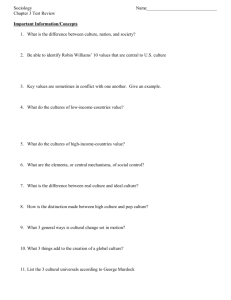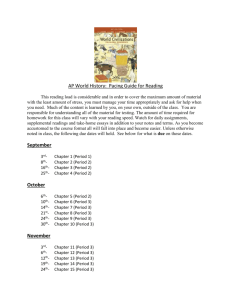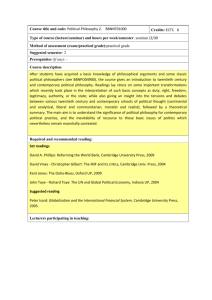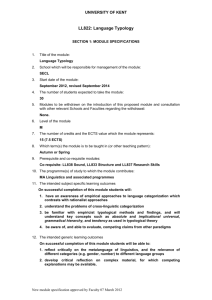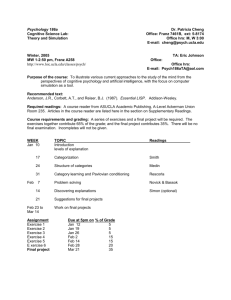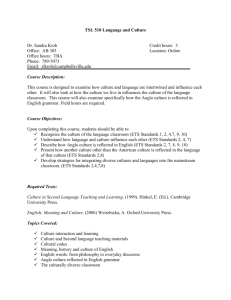ANTH 4800: Advanced Topics in Linguistics: University of Colorado, Colorado Springs
advertisement
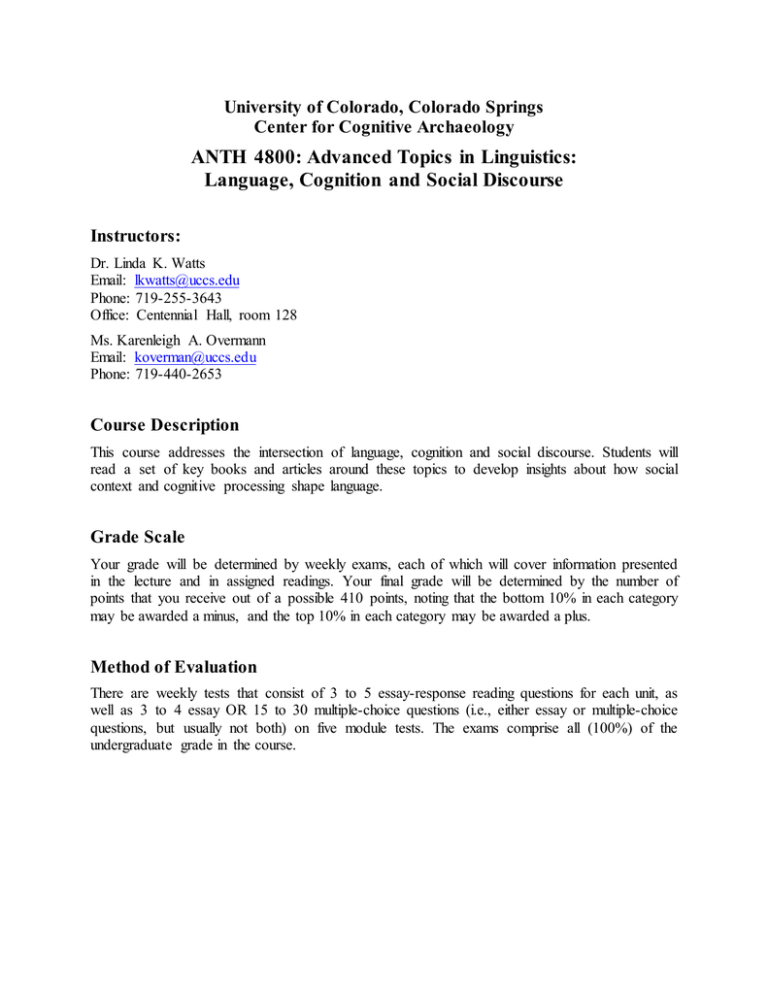
University of Colorado, Colorado Springs Center for Cognitive Archaeology ANTH 4800: Advanced Topics in Linguistics: Language, Cognition and Social Discourse Instructors: Dr. Linda K. Watts Email: lkwatts@uccs.edu Phone: 719-255-3643 Office: Centennial Hall, room 128 Ms. Karenleigh A. Overmann Email: koverman@uccs.edu Phone: 719-440-2653 Course Description This course addresses the intersection of language, cognition and social discourse. Students will read a set of key books and articles around these topics to develop insights about how social context and cognitive processing shape language. Grade Scale Your grade will be determined by weekly exams, each of which will cover information presented in the lecture and in assigned readings. Your final grade will be determined by the number of points that you receive out of a possible 410 points, noting that the bottom 10% in each category may be awarded a minus, and the top 10% in each category may be awarded a plus. Method of Evaluation There are weekly tests that consist of 3 to 5 essay-response reading questions for each unit, as well as 3 to 4 essay OR 15 to 30 multiple-choice questions (i.e., either essay or multiple-choice questions, but usually not both) on five module tests. The exams comprise all (100%) of the undergraduate grade in the course. Topics and Tests Module Week Topic Points Course Introduction: Toward the Relative Non-Arbitrariness of the Linguistic Sign 1 1 Introduction to Language in Relation to Social Discourse 15 Indexical Parameters of Language 25 2 Module 1 Test 20 Language Universals and Linguistic Typology 3 Language Universals 40 4 Morphological Typology 30 2 5 Linguistic Typological Features 20 Language in Social Discourse—More on Situational Contexts 30 6 Module 2 Test 30 Applications/Case Studies General Case—Language Typology and Some Discourse 20 7 3 Parameters in Native American Languages Case Study—Relational Terminology at Zuni Pueblo 20 8 Module 3 Test 10 Language and the Brain 9 Two Perspectives (Chomsky and Bybee) 15 4 10 Cognitive Processing in Language 15 The Role of Perception 10 11 Module 4 Test 30 Origin Hypotheses and Methodologies Origin Theories: Social Grooming (Dunbar) and Gestural 10 12 Origins (Corballis) Hypotheses 5 13 Origin Theories: Protolanguage (Bickerton and Chomsky) 10 Rara and Rarissima; Methodologies 10 14 Module 5 Test 30 Concluding Thoughts 6 15 Conclusions and Course Integration 20 TOTAL 410 As an undergraduate student, your final grade will be determined by the number of points that you receive out of a maximum of 410 points on the reading questions and module tests: A B C D F 90.0–100.0% (369–410 points) 80.0–89.9% (328–368 points) 75.0–79.9% (307–327 points) 70.0–74.9% (287–306 points) Below 69.9% (below 286 points) Readings Required Books (please purchase or access): • • • de Saussure, Ferdinand. 1972. Course in general linguistics. Peru, IL: Open Court Press. Comrie, Bernard. 1989. Language universals and linguistic typology, 2nd ed. Chicago: University of Chicago Press. Bybee, Joan. 2010. Language, usage and cognition. Cambridge: Cambridge University Press. Weekly Readings: Required and suggested supplementary articles are available in pdf format online, under the individual unit assignments. Wk. Readings 1 Saussure (entire book). 2 Silverstein, Michael. 1976. Shifters, linguistic categories, and cultural description. In Meaning in anthropology. K. H. Basso and H. A. Selby, eds. Pp. 11–55. Albuquerque: University of New Mexico Press. Jakobson, Roman. 1957. Shifters, verbal categories, and the Russian verb. New York: Harvard University. 3 Comrie, Ch. 1: Language universals. Greenberg, Joseph H. 1966. Some universals of grammar with particular reference to the order of meaningful elements. In Universals of language: report of a conference held at Dobbs Ferry, New York, April 13–15, 1961. Joseph H. Greenberg, ed. Pp. 73–113. Whitefish, MT: Literary Licensing, LLC. (Ch. 5). Supplemental reading: Casagrande, Joseph B. 1966. Language universals in anthropological perspective. In Universals of language: report of a conference held at Dobbs Ferry, New York, April 13–15, 1961. Joseph H. Greenberg, ed. Pp. 279–98. Whitefish, MT: Literary Licensing, LLC.” (Ch.10). 4 Sapir, Edward. 1949[1921]. Types of linguistic structure. In Language—an introduction to the study of speech. Pp. 120–46. New York: Harcourt, Brace & World. Comrie, Chs. 2 and 4. Supplemental reading: Comrie, Ch. 10: Typology and historical linguistics. Bickel, Balthasar. 2007. Typology in the 21st century: major current developments. Linguistic Typology 11:239–51. Fillmore, Charles J. 1967. The case for case. Dixon, Robert M. W. 1994. Ergativity. Cambridge: Cambridge University Press. (Esp. Chs. 1, 4, 5). 5 Comrie, Chs. 3 and 5–9. Supplemental reading: World Atlas of Language Structures (WALS): WALS is online with free access (http://wals.info/). 6 Brown, Penelope, and Stephen Levinson. 1978. Universals in language usage: politeness phenomena. In Questions and politeness: strategies in social interaction. Cambridge Papers in Social Anthropology, No. 8. Esther N. Goody, ed. Pp. 56–290. Cambridge: Cambridge University Press. Brown, Roger, and A. Gilman. 1960. The pronouns of power and solidarity. In Style in language. Thomas A. Sebeok and John W. Ashton, eds. Pp. 253–76. Whitefish, MT: Literary Licensing, LLC. Bean, Susan S. 1978. Symbolic and pragmatic semantics: a Kannada system of address. Chicago: University of Chicago Press. (Ch. 1). Supplemental readings: Goody, Esther N. 1978. Toward a theory of questions. In Questions and politeness: strategies in social interaction. Cambridge Papers in Social Anthropology, No. 8. Esther N. Goody, ed. Pp. 17–43. Cambridge: Cambridge University Press. Boas, Franz. 1940. The relationship system of the Vandau. In Race, Language and Culture. Pp. 384–96. Chicago: University of Chicago Press. Hymes, Dell. 1993. On typology of cognitive styles in language (with examples from Chinookan). Anthropological Linguistics 35(1/4):440–75. Halliday, M. A. K. 1978. Meaning potential. In Language as social semiotic: the social interpretation of language and meaning. Baltimore: University Park Press. Swartz, Marc J. 1960. Situational determinants of kinship terminology. Southwestern Journal of Anthropology 16(4):393–7. 7 8 Mithun, Marianne. 1996. Overview of general characteristics. Handbook of North American Indians 17:137–57. Boas, Franz. 1911. Introduction. In Handbook of American Indian languages. Part 1. Washington: Government Printing Office. Supplemental readings: Hale, Kenneth. 1973. A note on subject-object inversion in Navajo. In Issues in linguistics: papers in honor of Henry and Renée Kahane. Braj B. Kachru, Robert B. Lees, Yakov Malkiel, Angelina Pietrangeli, and Sol Saporta, eds. Pp. 300–309. Urbana, IL: University of Illinois Press. Munro, Edmonson. 1958. Status terminology and the social structure of North American Indians. Seattle: Washington University Press. Silver, Shirley, and Wick R. Miller. 1997. Languages and structures. In American Indian languages: cultural and social contexts. Pp. 17–45. Tucson: University of Arizona Press. Watts, Linda K. 1997. Zuni family ties and household-group values. Journal of Anthropological Research 53(1):17–29. Watts, Linda K. 2000. The social semiotics of relational terminology at Zuni Pueblo. Lewiston, NY: Edwin Mellen Press (Chs. 1–5). Ladd, Edmund J. 1979. Zuni social and political organization. Handbook of North American Indians 9:482–91. Supplemental readings: Kroeber, Alfred L. 1916. Zuni kin and clan. Whitefish, MT: Kessinger Publishing. (Ch. 1) Schneider, David M., and John M. Roberts. 1956. Zuni kin terms. Lincoln: University of Nebraska. Carter, Anthony T. 1984. Household histories. In Households—comparative and historical studies of the domestic group. Robert McC. Netting, Richard R. Wilk, and Eric J. Arnould, eds. Pp. 44–83. Berkeley: University of California Press. 9 10 11 12 Bybee, Chs. 1–3. Chomsky, Noam. 1965. Aspects of the theory of syntax. Cambridge, MA: MIT Press. Supplemental readings: Baddeley, Alan. 2003. Working memory: looking back and looking forward. Nature Reviews: Neuroscience 4:829–39. Hauser, Marc D., Noam Chomsky, and W. Tecumseh Fitch. 2002. The faculty of language: What is it, who has it, and how did it evolve? Science 298:1569–79. Corballis, Michael C. 2007. Recursion, language, and starlings. Cognitive Science 31:697–704. Hockett, Charles. 2009[1960]. The origin of speech. In Making sense of language: readings in culture and communication. Susan D. Blum, ed. Pp. 16–20. New York: Oxford University Press. Cheour, Marie, Rita Ceponiene, Anne Lehtokoski, Aavo Luuk, Jüri Allik, Kimmo Alho, and Risto Näätänen. 1998. Development of language-specific phoneme representations in the infant brain. Nature Neuroscience 1(5):351–3. Bybee, Chs. 4–6. Glucksberg, Sam. 2008. How metaphors create categories—quickly. In The Cambridge handbook of metaphor and thought. Raymond Gibbs, ed. Pp. 67–85. Cambridge: Cambridge University Press. Chiappe, Dan L., and Penny Chiappe. 2007. The role of working memory in metaphor production and comprehension. Journal of Memory and Language 56:172–88. Perkins, Revere D. 1992. Language evolution. In Deixis, grammar and culture. Pp. 91–114. Amsterdam: John Benjamins Publishing Company. Supplemental readings: Paulesu et al. 2000. Cultural effect on brain function. Nature Neuroscience, 3(1):91–6. Berent, Iris, Tracy Lennertz, Jongho Jun, Miguel A. Moreno, and Paul Smolensky. 2008. Language universals in human brains. Proceedings of the National Academy of Sciences 105(14):5321–5. Ballard, Dana H., Mary M. Hayhoe, Polly K. Pook, and Rajesh P. N. Rao. 2002. Deictic codes for the embodiment of cognition. Behavioral and Brain Sciences 20:723–67. Bybee, Chs. 7–8. Berlin, Brent, and Paul Kay. 1991[1969]. Basic color terms: their universality and evolution. Berkeley: University of California Press. Numerosity, lexical numbers, and grammatical number (Overmann, 2013, draft article submitted for publication). Supplemental readings: Carey, S. 2009. The origin of concepts. Oxford: Oxford University Press. (Chapter on numerosity). Coolidge, Frederick L., and Karenleigh A. Overmann. 2012. Numerosity, abstraction, and the emergence of symbolic thinking. Current Anthropology 53(2):204–25. Dunbar, Robin I. M. 1991. Functional significance of social grooming in primates. Folia primatologica 57(3):121–31. Corballis, Michael. 1999. The gestural origins of language: Human language may have evolved from manual gestures, which survive today as a “behavioral fossil” coupled to speech. American Scientist 87(2):138–45. 13 14 Supplemental readings: Givón, Talmy. 2002. The visual information-processing system as an evolutionary precursor of human language. In The evolution of language out of prelanguage. Typological Studies in Language 53. Talmy Givón and Bertram F. Malle, eds. Pp. 3–50. Amsterdam: John Benjamins Publishing Co. Wynn, Thomas. 1991. Tools, grammar, and the archaeology of cognition. Cambridge Archaeological Journal 1:191–206. Arbib, Michael A. 2011. From mirror neurons to complex imitation in the evolution of language and tool use. Annual Review of Anthropology 40:257–73. Malle, Bertram F. (2002). The relation between language and theory of mind in development and evolution. In The evolution of language out of pre-language. Typological Studies in Language 53. Talmy Givón and Bertram F. Malle, eds. Pp. 265–84. Amsterdam: John Benjamins Publishing Co. Bickerton, Derek. 2002. From protolanguage to language. Proceedings of the British Academy 106:103–20. Chomsky, Noam. 2004. Biolinguistics and the human capacity. Lecture at MTA, Budapest, May 17, 2004. Supplemental reading: Botha, Rudolf. 2012. Protolanguage and the ‘‘God particle’. Lingua 122:1308–24. Davidson, Iain, and William Noble. 1989. The archaeology of perception: traces of depiction and language. Current Anthropology 30(2):125–55. Ploog, Detlev. 2002. Is the neural basis of vocalization different in non-human primates and Homo sapiens? Proceedings of the British Academy 106:121–35. Fitch, W. Tecumseh. 2000. The evolution of speech: a comparative review. Trends in Cognitive Sciences 4(7):258–67. Jürgens, U. 2007. The neural control of vocalization in mammals: A review. Journal of Voice 23(1):1–10. Cysouw, Michael, and Jan Wohlgemuth. 2010. The other end of universals: theory and typology of rara. In Rethinking universals: how rarities affect linguistic theory. Empirical Approaches to Language Typology 45. Jan Wohlgemuth and Michael Cysouw, eds. Pp. 1–10. Berlin: Walter de Gruyter. Güldemann, Tom, and Mark Stoneking. 2008. A historical appraisal of clicks: a linguistic and genetic population perspective. Annual Review of Anthropology 37: 93–109. Evans, Nicholas, and Stephen C. Levinson. 2009. The myth of language universals: language diversity and its importance for cognitive science. Behavioral and Brain Sciences 32:429–92. Supplemental readings: Dunn, Michael, Angela Terrill, Ger Reesink, Robert A. Foley, and Stephen C. Levinson. 2005. Structural phylogenetics and the reconstruction of ancient language history. Science 309, 2072–5. Levinson, Stephen C., and Russell D. Gray. 2012. Tools from evolutionary biology shed new light on the diversification of languages. Trends in Cognitive Sciences 16(3): 167–73. Atkinson, Quentin D. 2011. Phonemic diversity supports a serial founder effect model of language expansion from Africa. Science 332:346–9. 15 Pagel, Mark, Quentin D. Atkinson, Andreea S. Calude, and Andrew Meade. (2013). Ultraconserved words point to deep language ancestry across Eurasia. Proceedings of the National Academy of Sciences 10.1073:1–6. Bybee, Ch. 11 Due Dates and Deadlines The syllabus in Blackboard contains the deadline for each unit and module and specifies the dates by which tests must be completed. For each deadline, you have until 11:59 PM on the deadline day. Remember, these are DEADLINES. You are encouraged to stay well ahead of these deadlines. The sooner you complete the work, the sooner you'll be done with the course. You must complete each unit by the specific date in the Blackboard version of the syllabus. Once that date has passed, you can still access the material in the unit, but you can no longer take the test associated with that unit. For example, if Unit 3 must be completed by Thursday, September 16, if you don't take Test 3 by 11:59 PM on September 16, you will receive a 0 for that test. Your Professors Expectations of You During completion of this course, you must abide by the UCCS Student Conduct Code. This code specifies what is considered proper and improper student conduct, including matters such as cheating and inappropriate behavior. Students who do not abide by the code can receive sanctions ranging up to expulsion from the course or the university. Remember that this is a 3 credit-hour course. Please plan on spending a lot of time working on just this class. This time will include reviewing lesson plans, completing online lectures, reading from your textbook, answering practice problems, verifying your work, and completing test. We suggest that you plan to spend at least 10 hours per week on average. Of course, the amount of time spent does not guarantee you any particular grade. Your letter grade will reflect the amount of material that you learned, as reflected in your test scores and the overall quality of your contributions to the course. Solving Technical Difficulties When you're having technical difficulties (pages not loading, connectivity problems, not able to view images, things not working as they should, etc.), please contact the Blackboard Helpdesk toll-free at 877.654.8309 or online at the UCCS Blackboard Support page. The Blackboard Helpdesk is available 24 hours a day, 7 days a week. Please note this service is separate from the UCCS IT Helpdesk. Help Understanding Course Material When you have questions regarding course policies, grading criteria, test administration, or course content, please email your professors for assistance.
